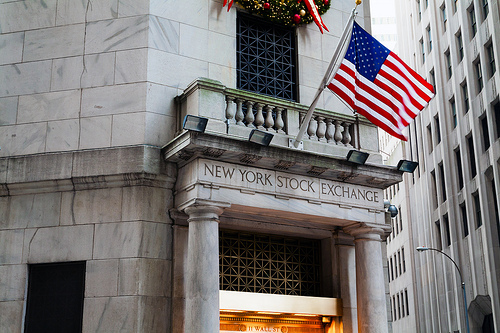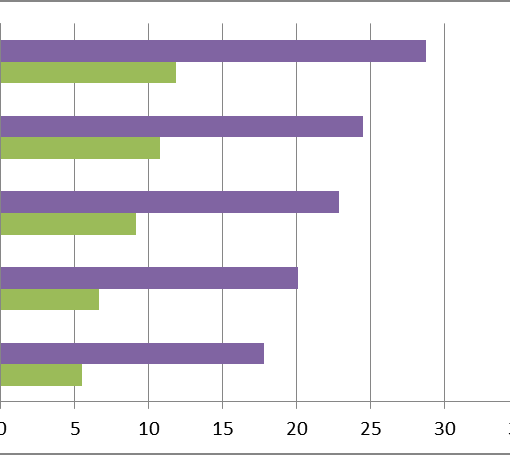Author: Donald Jowdy, Suncoast Equity
Disclaimer: Donald owns NKE, ACN, CHKP, GOOG, HPQ, MSFT, AAPL, and V in his Covestor Suncoast Equity model.
October 6, 2010: Earnings growth for our portfolio companies remains overshadowed by volatility and the manic-depressive behavior of the markets. Our portfolio holds considerable appreciation potential based on prospects of our businesses and the substantial relative value versus bonds.
Swift earnings growth – Portfolio Developments
In spite of a slow economic recovery in the U.S., our portfolio companies are reporting impressive earnings gains.
Nike (NKE) recently reported future orders for its products to be the highest in a decade at +13%. NKE is creating products that consumers desire and are willing to pay for. Sales in emerging markets grew 24% and the company raised prices where demand was strong. NKE’s CEO Mark Parker has set a goal of growing sales by more than 40% to $27 billion by 2015.
Back home the economic recovery is being led by spending on electronics. As we seek growth businesses, technology and information services have been our largest portfolio weighting and includes Accenture, Apple, Check Point Systems, Google, Hewlett Packard, and Microsoft. Consumer spending on smart phones, personal computing devices (PC), and TVs is often at the expense of other goods such as appliances, furniture and clothes.
Apple (AAPL) is clearly a leader. AAPL is experiencing growth on many fronts including new geographies, new product offerings and expanded uses for its products. The geographic frontier in China, a most important market, has just begun. In July the company opened its second store, in Shanghai, and it plans to open 25 more in China by the end of 2011. AAPL has 283 stores in all, 62 internationally.
The new iPad is a game-changer in so many ways. Led by innovation, brand reputation and salesmanship (CEO Steve Jobs is no slouch in this department), it is creating landslide results for AAPL. AAPL has sold over 3 million iPad units since its release in April, compared to 275+ million iPods over 9 years and 60 million iPhones which were launched in 2007. This device is making inroads into TV/entertainment, books, business and medical fields, and in many ways not yet discovered. Books come alive (goodbye books on tape!) with the iPad ranging from children’s stories to travel guides to college textbooks. Previously, all these types of digital books have been slow to develop because of hardware concerns (i.e. Amazon’s Kindle text only), but now are on the rise as the iPad’s strengths allow full use of color, touch and video to manipulate a character, locate a restaurant in Italy or bring to life 3-D views of DNA molecules.
Expanded use for AAPL products is not limited to the iPad. AAPL is making in-roads with its iPhone in the corporate world and is blurring the lines between work and play. AAPL’s increasing customer base wants to use the iPhone for business and they demand applications that deliver performance. The iPhone 4’s new FaceTime video conferencing supports the movement. More importantly, the networking effect of the AAPL customer base continues to lead the change and transformation in the mobile access market. A key example is business enterprise software maker SAP creating programs that can run in 15 seconds via the iPhone instead of two minutes previously. Fifteen seconds is about the maximum amount of time a user will wait before going on to something else, checking email, text messages, etc. SAP, like so many other companies, is developing technology to support real-world experiences of its customers that are flocking to AAPL products. The iPad is also being embraced by the corporate world. To even AAPL management’s surprise, half of the Fortune 100 are testing or deploying iPads. AAPL has a huge head-start with this mobile device. AAPL boasts many business positives and as its stock price rise reflects that success we will keep a keen eye on the relationship between its stock price and intrinsic value. We expect much stock price volatility and we will take advantage of it when opportunities arise.
Microsoft’s business is also doing well as evidenced by having sold 150+ million copies of Windows 7 since its debut last October through June 30th, making it the fastest-selling operating system in the company’s history. MSFT has also been busy lining up customers for its Azure cloud computing system. The cloud computing market is expected to grow 17% to $68 billion in 2010 and more than double to nearly $150 billion by 2014. Cloud computing is simply services for companies offered over the internet on a vast array of servers around the globe instead of having your technology infrastructure in-house. Because price appreciation for MSFT and a few of our other technology stocks lags the positive developments in their business, they have significant appreciation potential.
We added to our initial Visa (V) investment during the quarter. V operates the world’s largest payment system network including credit, debit, prepaid, and commercial payments. We took advantage of the price decline in V stock, mostly over worries about increased regulation (Senator Durbin’s interchange regulation), which we believe will not have a material negative impact on its business model. V is expected to grow its earnings in excess of 15% in both 2010 and 2011. We sold our position in Novo Nordisk, because of better value in our other holdings, and ADP, due to better growth prospects in our other companies.
Near-term the only certainty continues to be extraordinary volatility in all markets. The U.S. economy is slow to recover, elections are around the corner, and the Bush tax cuts face expiration at the end of the year. This volatility has yielded opportunities throughout the year and we are poised to keep our focus on businesses with great balance sheet strength and solid growth prospects.
Thanks for your continued support.
Sincerely,
Donald R. Jowdy
President



